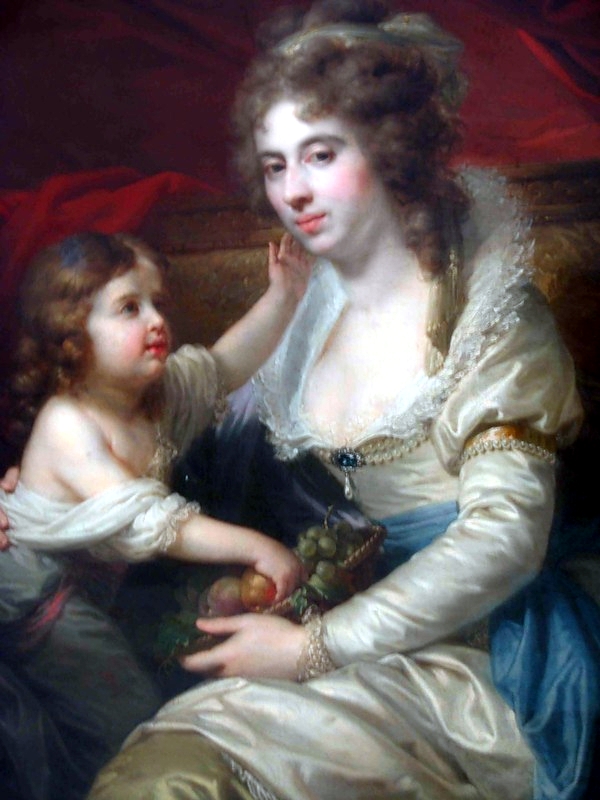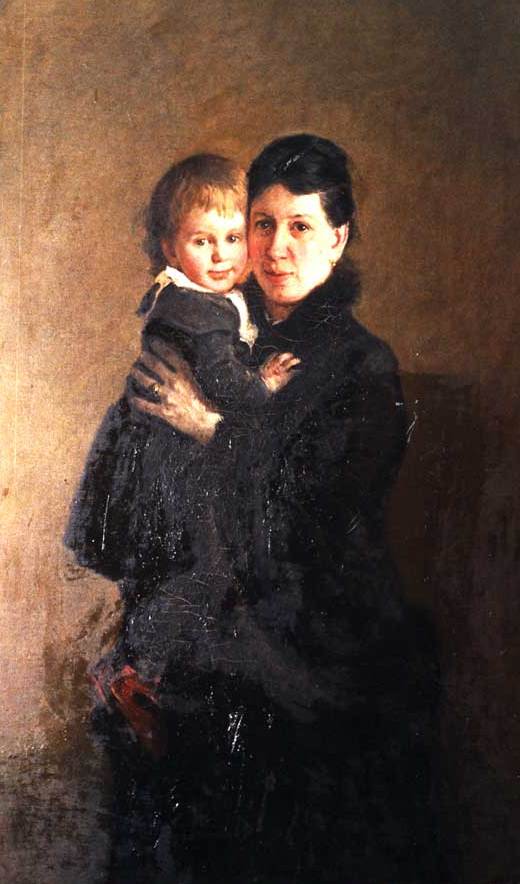|
Vera Zavadovskaya
Vera Nikolaevna Zavadovskaya (née Apraksina, 2 November 1768 – 22 November 1845) was a Russian courtier. She served as maid of honour to Catherine the Great. She was married to Pyotr Zavadovsky and known for her love affair with Prince Ivan Baryatinsky and for being the mistress and muse of the poet Sergey Marin. Biography Vera was born the only daughter of Lieutenant of the Horse Guards, Count Nikolai Fedorovich Apraksin from his marriage to maid of honour Sofia Osipovna Zakrevskaya, daughter of the Cossack Osip Zakrevsky who was raised to nobility, and Anna Grigorievna Razumovskaya (1722-1758), the beloved sister of Kirill and Alexei Razumovsky. Both of her younger brothers died in childhood. Vera's mother, Sophia, had a great influence on her uncle Kirill Razumovsky, after the death of his wife in 1771, she moved with her family into his house where she became his mistress. Vera would live with her uncle from the age of two, until her marriage. Marriage By age 1 ... [...More Info...] [...Related Items...] OR: [Wikipedia] [Google] [Baidu] |
Saint Petersburg
Saint Petersburg ( rus, links=no, Санкт-Петербург, a=Ru-Sankt Peterburg Leningrad Petrograd Piter.ogg, r=Sankt-Peterburg, p=ˈsankt pʲɪtʲɪrˈburk), formerly known as Petrograd (1914–1924) and later Leningrad (1924–1991), is the second-largest city in Russia. It is situated on the Neva River, at the head of the Gulf of Finland on the Baltic Sea, with a population of roughly 5.4 million residents. Saint Petersburg is the fourth-most populous city in Europe after Istanbul, Moscow and London, the most populous city on the Baltic Sea, and the world's northernmost city of more than 1 million residents. As Russia's Imperial capital, and a historically strategic port, it is governed as a federal city. The city was founded by Tsar Peter the Great on 27 May 1703 on the site of a captured Swedish fortress, and was named after apostle Saint Peter. In Russia, Saint Petersburg is historically and culturally associated with t ... [...More Info...] [...Related Items...] OR: [Wikipedia] [Google] [Baidu] |
Paul I Of Russia
Paul I (russian: Па́вел I Петро́вич ; – ) was Emperor of Russia from 1796 until his assassination. Officially, he was the only son of Peter III of Russia, Peter III and Catherine the Great, although Catherine hinted that he was fathered by her lover Sergei Saltykov.Aleksandr Kamenskii, ''The Russian Empire in the Eighteenth Century: Searching for a Place in the World'' (1997) pp 265–280. Paul remained overshadowed by his mother for most of his life. He adopted the Pauline Laws, laws of succession to the Russian throne—rules that lasted until the end of the Romanov dynasty and of the Russian Empire. He also intervened in the French Revolutionary Wars and, toward the end of his reign, added Kingdom of Kartli-Kakheti, Kartli and Kakheti in Eastern Georgia into the empire, which was confirmed by his son and successor Alexander I of Russia, Alexander I. He was ''de facto'' Grand Master (order), Grand Master of the Knights Hospitaller, Order of Hospitallers from ... [...More Info...] [...Related Items...] OR: [Wikipedia] [Google] [Baidu] |
1768 Births
Events January–March * January 9 – Philip Astley stages the first modern circus, with acrobats on galloping horses, in London. * February 11 – Samuel Adams's circular letter is issued by the Massachusetts House of Representatives, and sent to the other Thirteen Colonies. Refusal to revoke the letter will result in dissolution of the Massachusetts Assembly, and (from October) incur the institution of martial law to prevent civil unrest. * February 24 – With Russian troops occupying the nation, opposition legislators of the national legislature having been deported, the government of Poland signs a treaty virtually turning the Polish–Lithuanian Commonwealth into a protectorate of the Russian Empire. * February 27 – The first Secretary of State for the Colonies is appointed in Britain, the Earl of Hillsborough. * February 29 – Five days after the signing of the treaty, a group of the szlachta, Polish nobles, establishes the Bar ... [...More Info...] [...Related Items...] OR: [Wikipedia] [Google] [Baidu] |
Mogilev Region
Mogilev Region or Mogilev Oblast or Mahiliow Voblasts ( be, link=no, Магілёўская вобласць; ''Mahiloŭskaja voblasć''; russian: link=no, Могилёвская область; ''Mogilyovskaya Oblast''), is a region (''oblast'') of Belarus with its administrative center at Mogilev (Mahilyow). Both Mogilev and Gomel Regions suffered severely after the Chernobyl nuclear radioactive reactor catastrophe in April 1986. Important cities within the region include Mogilev, Asipovichy and Babruysk. Geography The Mogilev Region covers a total area of , about 14% of the national total. The oblast's greatest extent from north to south is , from east to west - , while the highest point is above sea level and the lowest at above sea level. Many rivers flow through the Mogilev Region including the Dnieper (Dniapro), Berezina, Sozh, Druts, Pronya and Ptsich. The oblast' also has small lakes, the largest being the Zaozerye Lake with a surface area of . The Chigirin Res ... [...More Info...] [...Related Items...] OR: [Wikipedia] [Google] [Baidu] |
Sophia Tolstaya
Countess Sophia Andreyevna Tolstaya (née Behrs; russian: Со́фья Андре́евна Толста́я, sometimes anglicised as ''Sophia Tolstoy''; 22 August 1844 – 4 November 1919), was a Russian diarist, and the wife of Russian writer Count Leo Tolstoy. Biography Sophia Behrs was one of three daughters of a German physician Andrey Evstafievich Behrs (1808–1868) and his Russian wife Liubov Alexandrovna Islavinа (1826–1886). Her maternal great-grandfather, Count Pyotr Zavadovsky, was the first Minister of education in Russia's history. Sophia was first introduced to Leo Tolstoy in 1862 when she was 18 years old. At 34, Tolstoy was 16 years her senior. On 17 September 1862 the couple became formally engaged after Tolstoy gave Sophia a written proposal of marriage, marrying a week later in Moscow. At the time of their marriage, Leo Tolstoy was well known as a novelist after the publication of '' The Cossacks''. On the eve of their marriage, Tolstoy gave Sophia his di ... [...More Info...] [...Related Items...] OR: [Wikipedia] [Google] [Baidu] |
Alcoholism
Alcoholism is, broadly, any drinking of alcohol (drug), alcohol that results in significant Mental health, mental or physical health problems. Because there is disagreement on the definition of the word ''alcoholism'', it is not a recognized diagnostic entity. Predominant diagnostic classifications are alcohol use disorder (DSM-5) or alcohol dependence (ICD-11); these are defined in their respective sources. Excessive alcohol use can damage all organ systems, but it particularly affects the brain, heart, liver, pancreas and immune system. Alcoholism can result in mental illness, delirium tremens, Wernicke–Korsakoff syndrome, Heart arrhythmia, irregular heartbeat, an impaired immune response, liver cirrhosis and alcohol and cancer, increased cancer risk. Drinking during pregnancy can result in fetal alcohol spectrum disorders. Women are generally more sensitive than men to the harmful effects of alcohol, primarily due to their smaller body weight, lower capacity to metaboli ... [...More Info...] [...Related Items...] OR: [Wikipedia] [Google] [Baidu] |
London
London is the capital and largest city of England and the United Kingdom, with a population of just under 9 million. It stands on the River Thames in south-east England at the head of a estuary down to the North Sea, and has been a major settlement for two millennia. The City of London, its ancient core and financial centre, was founded by the Romans as '' Londinium'' and retains its medieval boundaries.See also: Independent city § National capitals The City of Westminster, to the west of the City of London, has for centuries hosted the national government and parliament. Since the 19th century, the name "London" has also referred to the metropolis around this core, historically split between the counties of Middlesex, Essex, Surrey, Kent, and Hertfordshire, which largely comprises Greater London, governed by the Greater London Authority.The Greater London Authority consists of the Mayor of London and the London Assembly. The London Mayor is distinguished fr ... [...More Info...] [...Related Items...] OR: [Wikipedia] [Google] [Baidu] |
Alexander Griboyedov
Alexander Sergeyevich Griboyedov (russian: Александр Сергеевич Грибоедов, ''Aleksandr Sergeevich Griboedov'' or ''Sergeevich Griboyedov''; 15 January 179511 February 1829), formerly romanized as Alexander Sergueevich Griboyedoff, was a Russian diplomat, playwright, poet, and composer. He is recognized as ''homo unius libri'', a writer of one book, whose fame rests on the verse comedy ''Woe from Wit'' or ''The Woes of Wit''. He was Russia's ambassador to Qajar Persia, where he and all the embassy staff were massacred by an angry mob as a result of the rampant anti-Russian sentiment that existed through Russia's imposing of the Treaty of Gulistan (1813) and Treaty of Turkmenchay (1828), which had forcefully ratified for Persia's ceding of its northern territories comprising Transcaucasia and parts of the North Caucasus. Griboyedov had played a pivotal role in the ratification of the latter treaty. Early life Griboyedov was born in Moscow, the exact year unk ... [...More Info...] [...Related Items...] OR: [Wikipedia] [Google] [Baidu] |
Alexander Bezborodko
Prince Alexander Andreyevich Bezborodko (russian: Князь Алекса́ндр Андре́евич Безборо́дко; 6 April 1799) was the Grand Chancellor of Russian Empire and chief architect of Catherine the Great's foreign policy after the death of Nikita Panin. Early life Аleksander Bezborodko was born in the city Glukhov, Cossack Hetmanate, Russian Empire on (now Hlukhiv, Ukraine) in a family of Zaporizhian Cossack nobility. His father Andrey Bezborodko was a general scribe (chancellor), while his mother Eudokia was a daughter of general judge Mikhail Zabila. He was educated at home and in the Kyiv-Mohyla Academy. Upon finishing his education, he entered the public service as a clerk in the office of Count P. A. Rumyantsev, then Governor-general of Little Russia, whom he accompanied to the Turkish War in 1768. He was present at the engagements of Larga and Kagul, and at the storming of Silistria. On the conclusion of the Treaty of Küçük Kaynarca (1774) t ... [...More Info...] [...Related Items...] OR: [Wikipedia] [Google] [Baidu] |
Alexander Vorontsov
Count Alexander Romanovich Vorontsov (russian: Алекса́ндр Рома́нович Воронцо́в) (4 February 17412 December 1805) was the Chancellor of the Russian Empire during the early years of Alexander I's reign. He began his career at the age of fifteen in the Izmailovsky regiment of the Guards. He was the son of Russian General-in-chief Roman Illarionovich Vorontsov (1707—1783) and Marfa Ivanovna Surmina (1718—1745). In 1759, Alexander's uncle, the grand chancellor Mikhail Illarionovich Vorontsov, sent him to Strasbourg, Paris and Madrid to train him in diplomacy. Under Peter III, who was in love with his sister Elizabeth, he represented Russia for a short time at the court of St James's. Catherine II created him a senator and president of the Board of Trade; but she never liked him, and ultimately (1791) compelled him to retire from public life. In 1802, Alexander I summoned him back to office and appointed him imperial chancellor. This was the p ... [...More Info...] [...Related Items...] OR: [Wikipedia] [Google] [Baidu] |
Peter Abelard
Peter Abelard (; french: link=no, Pierre Abélard; la, Petrus Abaelardus or ''Abailardus''; 21 April 1142) was a medieval French scholastic philosopher, leading logician, theologian, poet, composer and musician. This source has a detailed description of his philosophical work. In philosophy he is celebrated for his logical solution to the problem of universals via nominalism and conceptualism and his pioneering of intent in ethics. Often referred to as the " Descartes of the twelfth century", he is considered a forerunner of Rousseau, Kant, and Spinoza. He is sometimes credited as a chief forerunner of modern empiricism. In history and popular culture, he is best known for his passionate and tragic love affair, and intense philosophical exchange, with his brilliant student and eventual wife, Héloïse d'Argenteuil. He was a defender of women and of their education. After having sent Héloïse to a convent in Brittany to protect her from her abusive uncle who did not want her t ... [...More Info...] [...Related Items...] OR: [Wikipedia] [Google] [Baidu] |


.jpg)



.jpg)

